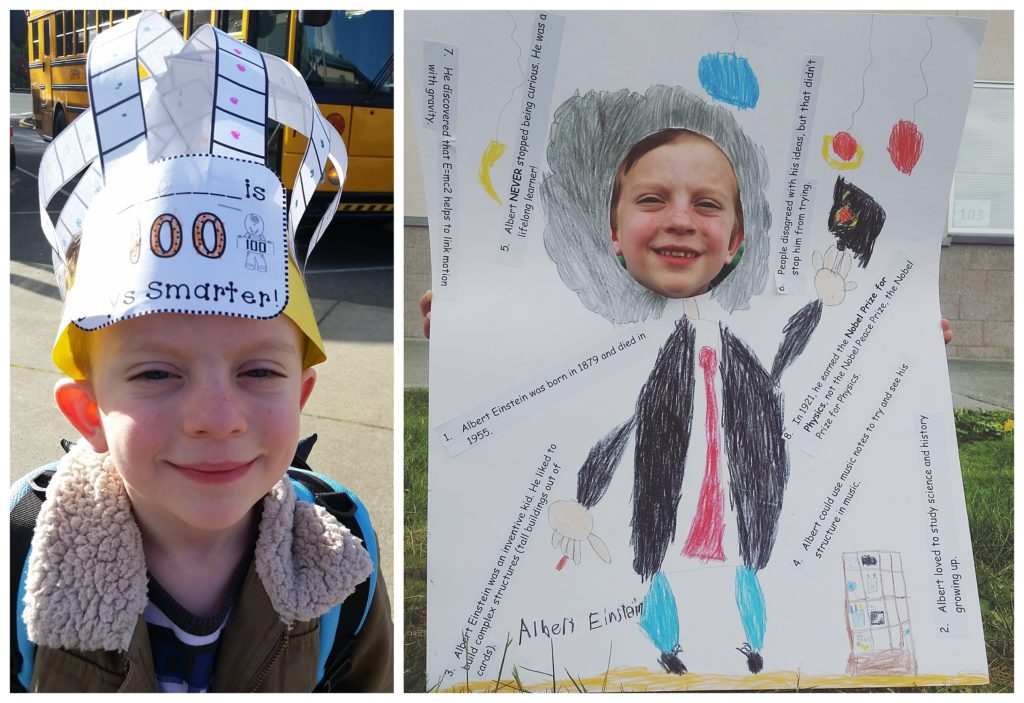Kim Hildenbrand, Guest Writer
When I found out my first son was profoundly gifted (PG), I was shocked … maybe a bit giddy. Wow, look at that! He’s a special kid, all right!
Fast-forward a couple of years (years filled with agonizing decisions, advocacy, and nonstop worrying about whether we were meeting his needs) and we found out our second son was also profoundly gifted. Forget the ticker-tape parade, and cue the sad trombones. I felt like I’d been slapped in the face. I turned to the psychologist, heart racing, and said, “You. Are. Joking.”
He laughed. “I never joke about IQ scores.”
So there it was. That was it. And here we go again.
Wow, this gifted kid thing sure is fun and easy! said no one ever.
Let me get one thing straight: I love my kids, absolutely adore them, and wouldn’t change a thing about them. But at times, having a gifted kid can be so dang hard. And all-consuming. And confusing. And draining.
We’ve tried to do our best; we really have. We got our boys into Davidson Young Scholars, which is a fantastic program for kids whose IQs are in the 99.9th percentile. We found a chess club that’s not too far away. And, most important, we took a long, hard look at our schooling situation, and decided we had to do something. The problem was what.

Public schools weren’t designed for profoundly gifted students.
If you’re the parent of a profoundly gifted child, I will tell you right now that probably public school’s not your top-tier, No. 1, 100 percent best option. How could it be? It’s not designed for kids who are that different.
However, if you’re like my family, it may well be your only option.
I so greatly admire families who homeschool and allow their gifted kids to radically accelerate and work to their full potential. I also listen eagerly when people talk about their private schools for gifted children. But public school is the solution that fits our lifestyle, careers, and budget. For those in the same boat, I’ve compiled a few tips for PG families who are navigating the world of public education.
1. Exercise patience.
They say the word that resonates most with gifted kids at school is waiting … waiting for others to catch up, waiting to not be so bored, waiting for the challenging stuff to start, waiting to find kids they can connect with … waiting, waiting, waiting. And sometimes that’s true for parents too.
If you choose a public school, remember they’re serving all kids: the kids who struggle, the high achievers, the kids with special needs, and the English language learners. Likely no one employed by your child’s school district is truly an expert about giftedness.
If you come in talking fast about 2e, processing speed, asynchronous development, executive functioning, and standard deviations above the norm, you might get a few funny looks. If you start getting pushy about class placement, you’ll get even funnier looks.
Remember that schools also have processes and systems that might make no sense to you. You likely will wait for a test to be given and then wait for the results … at some point, you might wait for emails and phone calls to answer what you consider simple questions.
You might encounter teachers who say, “Every child is gifted” and administrators who confuse giftedness with achievement. Do your best to be kind and patient. And when you get really frustrated, try to remember that they’re probably doing their best.
2. Know the limitations.
The ink was still drying on my son’s IQ test, yet I could hardly contain my excitement to show it to his school. Now they’ll get it, I thought. Now they can meet his needs!
But here’s the thing: Even in the best-case scenario, school GATE/highly capable programs are designed for gifted kids—not exceptionally or profoundly gifted kids. And there is as much difference between a profoundly gifted kid and a gifted kid as there is between a gifted kid and a typical kid! These kids are the outliers among outliers.
Your school cannot design a brand-new gifted program tailored specifically to your child. So you will likely find yourself making do, supplementing at home, and advocating. Your PG kid will need challenges—real challenges. Go in with your eyes wide open, and make a plan. And another plan. And maybe one more for good measure.
If you’re lucky, you’ll find amazing support right within your school. In our case, that means an excellent principal and several teachers who understand, respect, and care about our boys. Our teachers work tirelessly to give our sons the best possible experience, and they’re always open to our ideas.
3. Channel your frustration.
Once you dive into the world of gifted-kid stuff, the things you didn’t understand start to make sense. Ah, this is why my kid is so sensitive/ intense/ perfectionistic/ difficult/ wishy-washy/ impatient/ emotional/ stressed/ angry/ sad/ empathetic insert-your-adjective-here!
You may actually start to feel like an expert on giftedness! The problem? No one else quite gets it. After all, they’re not living it.
You may find yourself reading about how a certain test isn’t ideal for gifted identification, only to find out that it’s the test your kid’s school uses. Yikes. And yes, as bonkers as it is, there are profoundly gifted kids who can’t even make it into their own school’s gifted program because they didn’t pass the school’s ability or achievement tests. That’s the school district’s prerogative, and it will take time, energy, and teamwork to effect any sort of change.
At times you will be very, very frustrated. So channel it toward something positive. Start a conversation. Ask questions. Listen. Offer suggestions if they seem open, and seek outside advice if they don’t. (A gifted advocacy group or ombudsperson can be a lifesaver.) At some point down the road, you may be able to put your knowledge to good use by helping others.
4. Let go of guilt.
I have a lot of guilt about my kids’ educational experience. In particular, I wish I could borrow Hermione’s time-turner and zoom back to my middle child’s miserable first grade year, at which point I would whisk him out of that school and never look back—on the first day rather than the last.
I also have guilt that we can’t do everything: Often those cool gifted-kid classes are expensive and time-consuming, and they don’t always mesh with our family’s schedule.
Sometimes when I see what other PG kids are doing, I feel a pang … for instance, my older son doesn’t participate in Math Olympiad, he’s not on a science team, and he’s not enrolled in a college course. But he’s happy and he’s loved, and we talk all the time about how to better nurture his gifts. So I refuse to let guilt eat me up.
5. Get your kid a mentor.
My younger son’s kindergarten class has 24 little people in it. That’s a lot. But even in a small class at a public school, your kid’s just not always going to get the individual attention you may be hoping for.
When I wrote a personal essay for HuffPost about the challenges of having a gifted child, one of the best things that came out of it was an email from a college professor who offered to serve as a mentor.
Though he doesn’t live in our state, my boys’ mentor meets with both of them via Skype each week. They recite affirmations, and then he coaches them in chess, teaches them math concepts, and imparts words of wisdom. “You have another advocate,” their mentor said to me one day, and I can’t remember the last time I felt so deeply grateful.
6. Find your people.
I love my friends, but I can’t always talk to them about the stuff that’s going on with my kids. It just doesn’t work. Thanks to Davidson Young Scholars and a few other terrific programs, parents who understand my family’s unique challenges are only a click away. I can’t even express how important that is to me. Sometimes we speak in a kind of shorthand, and vent about things that only we understand.
Parenting a PG kid is no small task. I want to find the best opportunities, I want to advocate, but some days I don’t have a whole lot of fight left. Those are the days when I need my people to tell me I’m doing OK—and that my kids will be just fine.
Do a quick search—Hoagies, [your state] gifted association, profoundly gifted, PG, poppies, gifted children, gifted parenting, and other keywords and phrases are a good place to start. Find your people—and then hold on for dear life. Because having a gifted kid is one wild ride, and you don’t want to do it alone.


Kim Hildenbrand is a mom of three and writer in Washington state. She is a passionate advocate for gifted children. Find her on Twitter at @kimhildenbrand.

Yes! What she said!!! — but I’m still working on the don’t beat yourself up part…